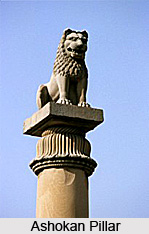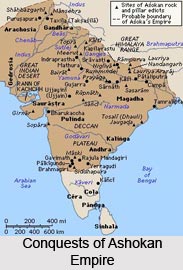 Ashoka was one of the greatest kings of the Mauryan dynasty. Ashoka ascended the throne in 273 B.C and proved himself a mighty conqueror. In the history of ancient India, the reign of Ashoka is marked with his aggressive imperialism as well as his own policy of religion. The personal religion of Ashoka and the religious policy he followed, provide a glimpse into the religious trends of the age. However Ashoka is known in the history of India as the king who turned out to be a resolute non-violent Buddhist from a mighty vanquisher. But the scholars are at variance about the personal religious belief of Ashoka, his date of conversion into Buddhism and the actual causes, which prompted him to adopt Buddhism.
Ashoka was one of the greatest kings of the Mauryan dynasty. Ashoka ascended the throne in 273 B.C and proved himself a mighty conqueror. In the history of ancient India, the reign of Ashoka is marked with his aggressive imperialism as well as his own policy of religion. The personal religion of Ashoka and the religious policy he followed, provide a glimpse into the religious trends of the age. However Ashoka is known in the history of India as the king who turned out to be a resolute non-violent Buddhist from a mighty vanquisher. But the scholars are at variance about the personal religious belief of Ashoka, his date of conversion into Buddhism and the actual causes, which prompted him to adopt Buddhism.
Both the modern and the classical interpreters disagree regarding the personal religion of Ashoka. Moreover Buddhist texts also provide some other theories about the personal religion of Ashoka. Formerly some scholars put that Ashoka was a Brahmanist or Jainist and not a Buddhist. Later this view was refuted and was declared that such an argumentative view arose due to the misinterpretation of the Ashokan edicts and the confusion of his personal views with the principles of the Mauryan policy as a whole. However the scholars again pointed out that in the accounts of Buddhaghosa, Ashoka was mentioned as "Brahmana Bhatto" or the adherent to Brahmanism. The "Samanta -padasiaka" also corroborates the fact that Ashoka was a Brahmana. According to Kalhana, Ashoka was a follower and worshiper of Lord Shiva. Later the Ceylonese chronicles depicted that originally Ashoka was a Brahman but later turned into a Buddhist and paid visits to the Buddhist communities or the Samghas. Therefore the contemporary historical records testify Ashoka as a Brahman. However historians, in the later years have opined that Ashoka`s identification with Buddhism as his personal religion was gradual rather than sudden.
Personal religion of Ashoka or rather the policies he followed is a subject of keen controversy among the historians and the scholars. According to Bongard Levin, Ashoka was a tolerant towards all other creeds throughout the major parts of his reign. But Levin also admitted that Ashoka had a close link with Buddhism and he also constructed a number of Viharas or Buddhist monasteries. As Levin has pointed out-- Ashoka`s benevolence to all the religions is in some way a methodical administrative policy of Ashoka. During Ashoka`s times, the sectarian rivals between Brahmanism, Ajivikism, Jainism and Buddhism weakened the very foundation of society and national integrity. Henceforth Ashoka practiced toleration towards all the religious creeds in order to restore national integrity. Moreover his toleration ceased to identify him as the orthodox and the sectarian king. Personal religion of Ashoka prompted him to reconcile among all the religions rather than to aggravate their conflict. In his own Rock edict Ashoka spoke about the essence (Sara) of all religions.  He preached against the condemnation of others religion and the exaltation of one`s own religion. Ashoka`s meetings and tours with the Brahmans and the Sramanas is mentioned in the rock edict VIII. Nevertheless Levin thinks that towards the end of his reign Ashoka departed the policy of religious toleration. Levin also holds that the sectarian edicts and the Bhabru edict and Brahmagiri edicts were issued during the end of his period. Ashoka`s open and complete identification with Buddhism occurred during this period. In Bhabru Edict Ashoka himself had inscribed his allegiance towards Buddhism. Bongard Levin has also interpreted that it was during this time when the sectarian conflict between Buddhism and other religions began, which sowed the seed of Pushyamitra`s campaign against the Buddhist Mauryas.
He preached against the condemnation of others religion and the exaltation of one`s own religion. Ashoka`s meetings and tours with the Brahmans and the Sramanas is mentioned in the rock edict VIII. Nevertheless Levin thinks that towards the end of his reign Ashoka departed the policy of religious toleration. Levin also holds that the sectarian edicts and the Bhabru edict and Brahmagiri edicts were issued during the end of his period. Ashoka`s open and complete identification with Buddhism occurred during this period. In Bhabru Edict Ashoka himself had inscribed his allegiance towards Buddhism. Bongard Levin has also interpreted that it was during this time when the sectarian conflict between Buddhism and other religions began, which sowed the seed of Pushyamitra`s campaign against the Buddhist Mauryas.
Ashoka was the first ruler of ancient India who consciously used Buddhism for the consolidation of his Empire. During the reign of Bimbisara and Ajatasatru, Buddhism survived in the shape of a Samgha. Ashoka sought the support of Buddhism to improve the social and the spiritual life of his subjects. Prior to Ashoka, Buddhism existed as a regional religion, but Ashoka adopted it as his personal religion and during his reign the creed expanded vastly. Relations between the samgha and society assumed a new character. He himself followed the non-violent traits of Buddhism in order to inspire his subjects for spiritual enlightenment through non-violence. With the adoption of Buddhism as Ashoka`s personal faith, this absolutely monkish religion assumed a socio-ethical character, which overflowed the geographical frontiers of India. Therefore historians in the later years have opined that the personal religion of Ashoka during his reign had become the state religion.



















